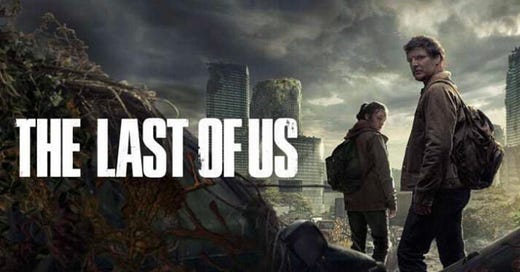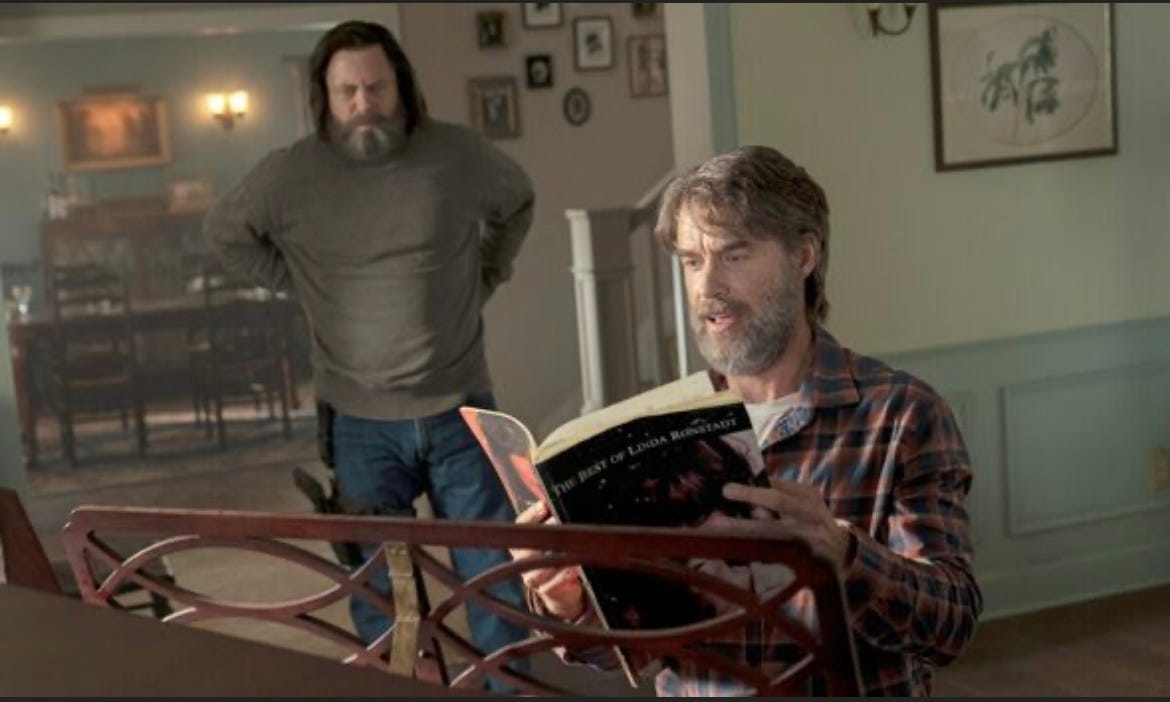For years the opening of Pixar’s Up was heralded as the finest ten minutes of cinema, mainly by people that don’t watch many movies. The compression of an average marriage leaving a lonely husband unsure of his place in the world was deeply touching. In HBO’s The Last Of Us, the post-apocalyptic drama ploughs a similar furrow in 70 minutes in which the ‘husband’ knows exactly his place in the world; or at least most of it. It’s effectively a gay Up with hunting rifles, defensive perimeter tripwires, and a dusty piano with the sheet music to Linda Ronstadt’s Long, long time that no one knew we needed; but we did.
I suspect there are already reels written about Long, long time, the 3rd episode of The Last of Us. It's the Zombie series that as with the mythical city of Zerzura, everyone needs two attempts at saying. It also has had critics in a froth. It depicts the world in which the latest ‘covid’ strain is a fungus contaminating mankind. With passenger jets dropping from the sky, apartment blocks in flames and gridlocked traffic, the first huge budget episode has the usual zombie tropes, and at times allows the viewer to forget it’s based on a computer game. The second episode feels as though you should be watching it in a red-leathered gaming chair with a headset and unpronounceable gamertag. However, it’s the extended 3rd episode, Long, long time that really grabs you by the lapels and refuses to let go.
It starts with straggler Frank falling into a trap, a man trap if you will, dug by Bill, who has wisely prepared for mass evacuation to government quarantine camps by hiding in a cellar with a gun wall, CCTV and presumably mountains of toilet roll. As the last man standing, he takes the opportunity to loot local shops, not for packs to complete his Pokémon collection or 96” TVs (although he does have a generator), but with a laser targeting on DIY stores and gas stations that suggests he has previously thought this through.
‘Oh. You’re a prepper?’ he’s asked, to which he curtly replies, ‘No, I’m a survivalist.’ Great reply. He’s planned for everything but human connection.
Without spoiling the two lovely bits of jaw-dropping misdirection their meeting quickly reveals itself as a love story between two gruff older men who might look more at home swapping copies of Woodwork Weekly. This is effectively the only two gays in the village, or more precisely, the only two people in the village. And for once you can ignore those woke alarm bells. This is no preaching of diversity shoehorned into a zombie genre; it’s zombies shoehorned into an elegant love story of kindness and vulnerabilities. In fact, it’s a stand-alone episode that is more interesting than the lead characters blowing up mushroom head zombies with hand grenades and spilt petrol. Focusing on two middle-aged men maturing feels as unusual as them being gay.
Above all this is about an ordinary love. Two people learning to live with one another and accepting their vulnerabilities, and finding meaning in them. And while the humourless woke zealots can get their gender-neutral knickers in a twist over actor Nick Offerman not actually being gay, the rest of us can enjoy the most tender of love stories and ultimately of survival that remarkably transcends the zombie genre.
It's hard to know if the makers are critiquing the hysterical worldwide response to Covid, which had healthy people quarantined alongside the slightly unwell in the same way the Government has intervened with the fungus virus. The unquestioning compliance also characterises the majority in the Last of Us. That it has been produced by a mainstream TV channel like SKY and is by the makers of Chernobyl, a brilliant series that highlighted the dangers of carelessly shutting down a nuclear reactor's power-regulating system and its emergency safety systems via liberal use of spooky 80s era soviet gas masks. It was masterful TV, although occasionally felt like an anti-nuclear power advert in a time when we apparently need low carbon and reliably energy production. I guess it’s easier to criticise a radioactive cloud the size of Europe than it is to dramatize shovelling up 100,000 birds per year skirting the base of wind turbines in the UK alone, But, at least the UK is reducing its 1% of global carbon emissions to zero while China are building 200+ new coal power plants.
Anyway, I digress, although the difference between a dystopian landscape of the last of us and the current one is about two government interventions and a leaflet drop, it’s easy to watch without looking over your shoulder if you’re that way inclined, but is so topical that it’s prescient overtones are hard to ignore, particularly when set against the backdrop of a charming love story sung to the tune of Linda Ronstadt Long, long time. It’s not often you encounter genuine essential viewing, but this is it.





